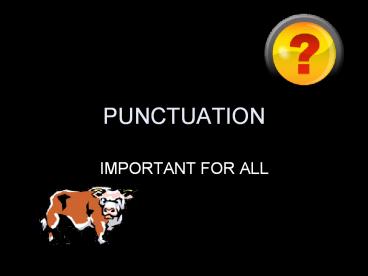PUNCTUATION - PowerPoint PPT Presentation
1 / 15
Title: PUNCTUATION
1
PUNCTUATION
- IMPORTANT FOR ALL
2
Introduction
- Punctuation marks are used to chunk text up
into meaningful units, marking a variety of
grammatical boundaries. Punctuation is all about
awareness of these grammatical chunks.
3
Explanation
- To split up texts into sentences, indicating
clearly where each major chunk of meaning begins
and ends, we use capital letters and full stops.
- Within the sentence, we use a variety of
punctuation marks to show breaks between phrases,
clauses and, sometimes, words. - Punctuation marks can sometimes suggest the tone
of voice in which a sentence should be read. - There are also some punctuation marks (the hyphen
and apostrophe) which work within words to help
clarify meaning.
4
FULL STOP
- We mark the start of a sentence with a capital
letter and the end with a full stop, exclamation
mark or question mark. - EG The big dog was barking.
5
QUESTION MARK ???
- Used at the end of an interrogative sentence.
- EG Who was that?
- OR whose function is a question.
- EG Youre leaving already?
6
EXCLAMATION MARK !!!
- Used at the end of a sentence (which may be
exclamative, imperative or declarative) or an
interjection to show strong emotion. - Exclamative What a pity!
- Imperative Get out!
- Declarative Its a goal!
- Interjection Oh dear!
7
DASH -
- A dash (-) can function like a colon to introduce
a quotation or a list, an explanation or
elaboration, or a summing up and two dashes can
mark off a parenthesis - Used to replace other punctuation marks (colons,
semi-colons, commas) or brackets. - Especially used in informal writing.
- EG It was a great day out everyone enjoyed it.
- Today I am going to go shopping (it is so cold
outside, I must be mad) mainly because I
organised a party tomorrow night. - (either side of parenthesis)
8
Parenthesis ( ) - - , ,
- A parenthesis is a word or phrase inserted into a
sentence to explain or elaborate. It may be
placed in brackets or between dashes or commas. - Brackets Sam and Emma (his oldest children) are
coming next weekend. - Dashes Michael is generally happy he sings in
the mornings! but responsibility weighs him
down. - Commas Paul is, I believe, our best student.
- The term parentheses (plural of parenthesis) can
also refer to the brackets themselves.
9
COMMA ,,,
- Separates parts of sentences, sometimes
corresponds to a pause in speech. - EG My favourite sports are football, motor cross
and badminton. - EG I got home, had a bath and went to bed.
- To mark off extra information Jill, my boss, is
full of fun. - After a subordinate clause which begins a
sentence Although it was cold, we didnt wear
our coats. - With many connecting adverbs (e.g. however, on
the other hand, anyway, for example). EG
Anyway, - I decided not to go.
10
COLON
- A colon () introduces a quotation or a list an
explanation or elaboration or a summing up. - List Today I will buy milk, jam, coffee and
sugar. - It can also be used before a second clause to
expand or explain the first part of the sentence.
Explanation He was very cold the temperature
was below freezing. - Summing up It can therefore be concluded that
he was guilty of murder, guilty of theft, guilty
of adultery and should be imprisoned
11
SEMI-COLON
- A semi-colon () finishes off one part
- of a sentence.
- Used to separate two main clauses in a sentence.
EG I liked the book it was a pleasure to read.
(It could be written as two separate sentences,
but they are closely related). - Also used to separate items in a list IF these
items consist of longer phrases. EG I need
large, juicy tomatoes half a pound of unsalted
butter a kilo of fresh pasta, preferably
tagliatelli and a jar of black olives.
12
INVERTED COMMAS
- Inverted commas ( ) ( ) mark quotations,
direct speech, foreign words or words used in an
unusual way. (Italics may sometimes be used
similarly) - Hello, I am Joe, replied the strange man.
(speech) - I dont like their clothes, but cest la vie.
(foreign word) - In the novel Holes, Stanley was glad that he
agreed to let X-Ray have anything he might find.
(quote)
13
HYPHEN -
- Sometimes used to join two parts of a compound
noun. EG city-centre. - EG break-in, write-off, mix-up, passer-by.
- Also with prefixes. EG co-worker, non-smoker,
and ex-wife, non-existent.
14
APOSTROPHE
- An apostrophe is used for omitted letter(s) when
a verb is contracted (i.e. shortened). - I am Im
- Who has whos
- Would have wouldve
- Or not is contracted to join the verb could not
becomes couldnt. - Also lets and oclock.
- Formal writing tends to write them out full.
- Possessive forms the cats tail, mothers iron.
- Plural, put the apostrophe at the end parents
car. - Irregular plurals, add the s childrens toys.
- GOOD LUCK
15
ELLIPSIS
- Ellipsis is the term used for three
- dots () which shows that something
- has been omitted or is incomplete.
- He said that he would maybe throw the stone
then he left. - It can also be used for suspense, not immediately
telling the rest of the story or having an open
ending. - It was very misty and as he turned the corner































